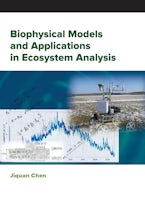The past five decades have witnessed a rapid growth of computer models for simulating ecosystem functions and dynamics. This has been fueled by the availability of remote sensing data, computation capability, and cross-disciplinary knowledge. These models contain many submodules for simulating different processes and forcing mechanisms, albeit it has become challenging to truly understand the details due to their complexity. Most ecosystem models, fortunately, are rooted in a few core biophysical foundations, such as the widely recognized Farquhar model, Ball-Berry-Leuning and Medlyn family models, Penman-Monteith equation, Priestley-Taylor model, and Michaelis-Menten kinetics. After an introduction of biophysical essentials, four chapters present the core algorithms and their behaviors in modeling ecosystem production, respiration, evapotranspiration, and global warming potentials. Each chapter is composed of a brief introduction of the literature, in which model algorithms, their assumptions, and performances are described in detail. Spreadsheet (or Python codes) templates are included in each chapter for modeling exercises with different input parameters as online materials, which include datasets, parameter estimation, and real-world applications (e.g., calculations of global warming potentials). Users can also apply their own datasets. The materials included in this volume serve as effective tools for users to understand model behaviors and uses with specified conditions and in situ applications.
ContentsForeword, by Dennis BaldocchiPrefaceList of Online Supplementary MaterialsList of Symbols1.1 Introduction1.2 Diurnal Changes of Air Temperature and Humidity1.3 Atmosphere Water Vapor Pressure and VPD1.4 Solar Radiation1.5 Heat Storages in Soil, Air and Vegetation1.6 Vertical Profile of Wind Speed1.7 Energy Balance1.8 SummaryOnline Supplementary MaterialsReferences2.1 Introduction2.2 Core Biophysical Models for Ecosystem Production2.4 Model Performances2.5 SummaryAcknowledgmentsReferences3.1 Introduction3.2 Models for Ecosystem Respiration3.3 Measured Datasets for Modeling Soil Respiration3.4 Model Performances3.5 SummaryOnline Supplementary MaterialsAcknowledgmentsReferences4.1 Introduction4.2 Methods for Quantifying ET4.3 ET Models4.4 Model Demonstrations4.5 SummaryAcknowledgmentsReferences5.1 Introduction5.2 Calculating GWP of Greenhouse Gases5.3 Calculating GWP from Surface Albedo5.4 Case ExamplesOnline Supplementary MaterialsReferencesIndexAuthors

